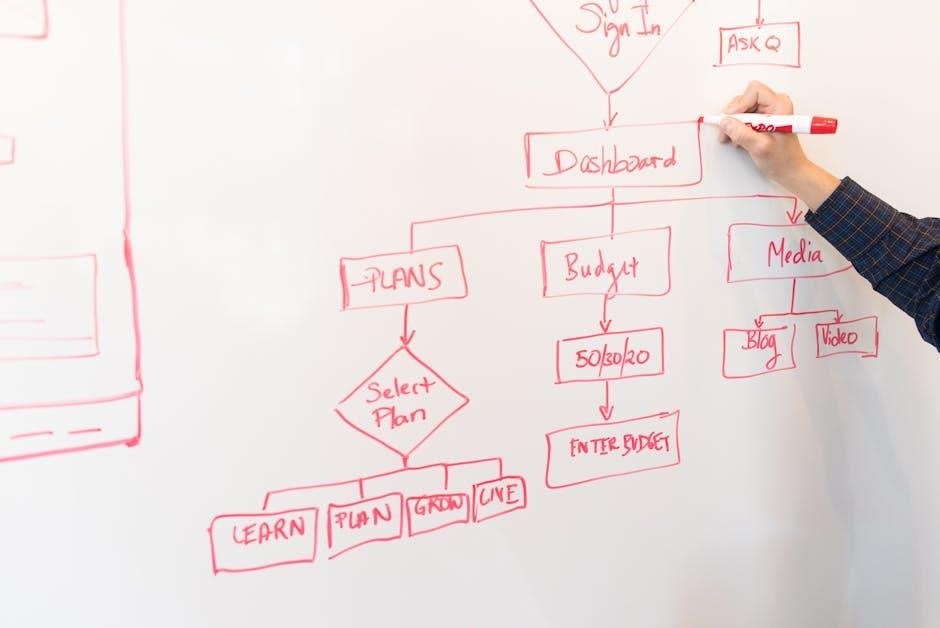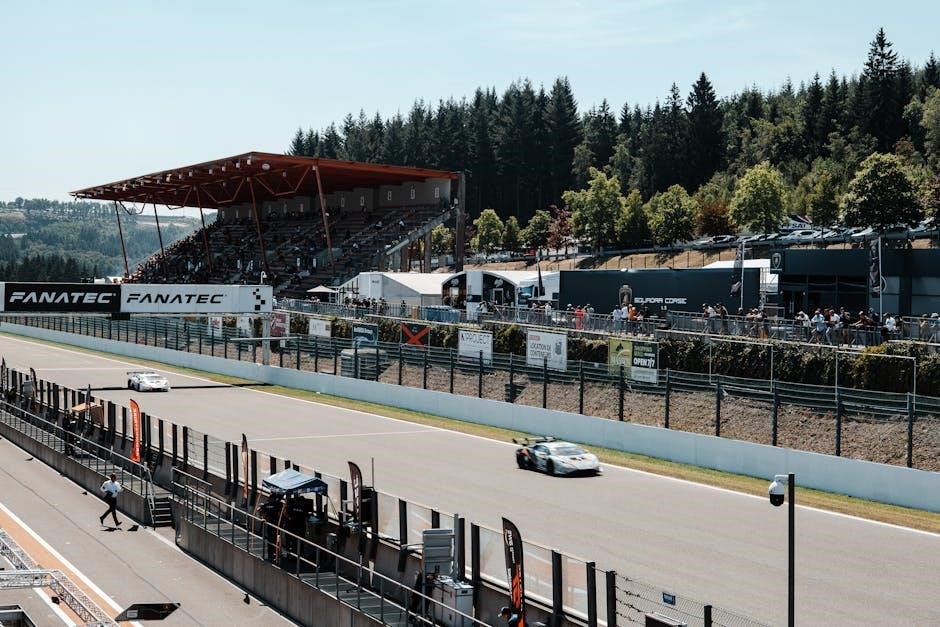The Global Management Challenge (GMC) is the world’s largest strategy and management competition, enabling teams to run virtual companies, fostering strategic thinking, and enhancing business acumen globally.
What is the Global Management Challenge?
The Global Management Challenge (GMC) is a renowned international strategy and management competition where teams of 3-5 members manage virtual companies in a realistic business environment. Launched in Portugal in 1980 by SDG and EXPRESSO, it has engaged over 600,000 participants worldwide, including executives and students. Teams compete by making strategic decisions to achieve the best investment performance for their companies. The GMC simulates real-world business scenarios, requiring skills in marketing, operations, finance, and human resources. It is a dynamic, interactive learning platform that fosters strategic thinking, decision-making, and problem-solving abilities, making it a valuable tool for both academic and professional development.
History and Evolution of the GMC
The Global Management Challenge (GMC) was launched in Portugal in 1980 by SDG and the EXPRESSO newspaper. Initially a local competition, it quickly gained popularity and expanded globally, becoming the world’s largest strategy and management competition. Over the years, it has evolved to include advanced tools, scenario guides, and detailed manuals to enhance participant experiences. The GMC has engaged over 600,000 participants worldwide, ranging from students to executives. Its growth reflects its ability to adapt to modern business challenges, offering realistic simulations and fostering strategic thinking. The GMC manual has also evolved, providing in-depth strategies and resources to help teams excel in the competition.
Benefits of Participating in the GMC
Participating in the Global Management Challenge offers numerous benefits, including practical experience in strategic decision-making, operations management, and financial planning. Teams gain hands-on experience in managing a virtual company, enhancing their problem-solving and leadership skills. The competition fosters collaboration and innovation, preparing participants for real-world business challenges. Additionally, the GMC provides access to detailed manuals and scenario guides, offering insights into advanced strategies and tools. By competing, participants can apply theoretical knowledge in a dynamic, competitive environment, ultimately improving their business acumen and readiness for professional roles. The GMC is a valuable platform for both students and executives to refine their managerial expertise.
Understanding the Global Management Challenge Manual
The Global Management Challenge Manual provides detailed strategies and tools to help teams excel, offering insights beyond the official manual for enhanced performance and success in the competition.
Structure and Content of the GMC Manual
The GMC Manual is a comprehensive guide designed to help participants master the Global Management Challenge. It is structured to cover all essential aspects of the competition, including company management, marketing strategies, operational decisions, and financial planning. The manual provides detailed insights into the game mechanics, offering practical advice on how to optimize performance. It includes sections on scenario analysis, risk management, and innovation, ensuring teams are well-prepared for any challenge. Additionally, the manual offers tools and resources, such as R&D strategies and recruitment maps, to enhance decision-making. By understanding the manual’s content, participants can develop effective strategies to outperform competitors and achieve success in the GMC.
Key Differences from the Official Manual
The GMC Manual differs from the official manual by providing detailed, advanced strategies and tools to outperform competitors. While the official manual offers a basic overview, the GMC Manual delves deeper into scenario-specific guidance, offering practical examples and expert tips. It includes comprehensive sections on market research, financial planning, and risk management, which are not covered in the official version. Additionally, it provides real-world applications of strategies and success stories from past winners, giving participants a competitive edge. The GMC Manual is designed to complement the official guide, offering a more in-depth and actionable approach to excelling in the Global Management Challenge.
How to Use the Manual Effectively
To maximize the benefits of the GMC Manual, start by thoroughly understanding the official manual. The GMC Manual complements it with advanced strategies and tools. Focus on scenario-specific guides and expert tips to refine your approach. Use the detailed sections on market research, financial planning, and risk management to strengthen your decision-making. Apply the practical examples and success stories to real-world challenges. Regularly review the manual to adapt strategies as the competition evolves. By integrating these insights, you can outperform competitors and achieve a competitive edge in the Global Management Challenge. Continuous learning and adaptation are key to success.

Getting Started with the Global Management Challenge
Begin by registering online and understanding the competition environment. Set up your virtual company, review the manual, and plan strategies to achieve market success effectively.
Registration and Login Process
Registration for the Global Management Challenge is done online through the official website. Teams of 3-5 members can sign up by providing personal and team details. Once registered, participants receive login credentials to access the competition platform. The login process is straightforward, requiring a username and password. Ensure your account is verified to avoid delays. The manual provides step-by-step guidance for registration and login, making it easy for new participants to join. Remember to keep your credentials secure and familiarize yourself with the platform before the competition begins. Troubleshooting tips are also available in the manual for any login issues.
Understanding the Competition Environment
The Global Management Challenge (GMC) simulates a realistic business environment where teams manage virtual companies in a competitive market. Participants operate in a dynamic economic setting, making strategic decisions to optimize performance. The competition environment mirrors real-world market conditions, including supply and demand, pricing, and production challenges. Teams must adapt to changing scenarios, such as economic fluctuations or unexpected events, to maintain a competitive edge. The GMC manual provides detailed insights into navigating these conditions, ensuring participants understand the complexities of the simulation. This understanding is crucial for developing effective strategies and achieving success in the competition.
Setting Up Your Virtual Company
Setting up your virtual company in the Global Management Challenge (GMC) involves several key steps. First, teams must register and log in to the GMC platform to access their company details. Once logged in, participants are provided with initial company information, including financial data, market position, and product details. The next step is to analyze this information and make strategic decisions on pricing, production, and marketing; Teams must also allocate resources effectively, balancing short-term needs with long-term goals; The GMC manual offers detailed guidance on these processes, ensuring teams are well-prepared to manage their virtual company successfully from the start.

Strategic Decision-Making in the GMC
Strategic decision-making in the GMC involves analyzing market trends, optimizing resources, and making informed choices to achieve a competitive edge and ensure long-term success.
Marketing Strategies for Success
Effective marketing strategies are crucial for success in the Global Management Challenge. Teams must conduct thorough market research to understand consumer preferences and competitor actions. Developing a strong brand identity and positioning products appropriately in the market can significantly enhance performance. Pricing strategies should balance profitability with market share goals, while advertising and promotion efforts must be tailored to target demographics. Additionally, understanding market trends and adapting quickly to changes can provide a competitive edge. By aligning marketing efforts with overall business objectives, teams can maximize their company’s success in the virtual marketplace and achieve sustainable growth.
Operations Management Tips
Optimizing operations is essential for achieving efficiency and profitability in the Global Management Challenge. Begin by aligning production plans with market demand to avoid overstocking or shortages. Implementing lean manufacturing practices can reduce waste and lower costs. Regularly review production schedules and adjust capacity to match market conditions. Invest in automation and advanced technologies to enhance productivity and reduce errors. Additionally, focus on improving supply chain management to ensure timely delivery of raw materials. Effective inventory control systems can minimize holding costs while maintaining sufficient stock levels. By streamlining operations, teams can improve profitability and gain a competitive edge in the simulation.
Financial Planning and Budgeting
Effective financial planning and budgeting are crucial for success in the Global Management Challenge. Teams must allocate resources efficiently, balancing investments in R&D, marketing, and operations. Start by forecasting revenue and expenses to establish realistic financial goals. Monitor cash flow closely to avoid liquidity crises and ensure sustainable growth. Prioritize investments that yield the highest returns, such as product innovation or market expansion. Regularly review financial statements to identify areas for cost reduction and optimize profitability. Maintain a healthy debt-to-equity ratio to safeguard financial stability. By implementing a well-structured financial strategy, teams can maximize shareholder value and achieve long-term success in the competition;
Human Resource Management
Human Resource Management (HRM) plays a pivotal role in the Global Management Challenge, focusing on optimizing workforce performance and company culture. Teams must strategically manage staffing levels, salaries, and training to maximize productivity while controlling labor costs. Investing in employee training can enhance efficiency and innovation, but balancing these investments with financial constraints is essential. Effective HR strategies also involve maintaining employee morale and adapting to market demands. Expert players emphasize the importance of aligning HR decisions with overall business objectives to foster a competitive edge. By prioritizing HRM, teams can create a motivated and adaptable workforce, driving long-term success in the competition.

Advanced Techniques for Competitive Edge
Advanced techniques in the GMC involve scenario analysis, market research, risk management, and innovation strategies to stay ahead of competitors and adapt to dynamic market conditions effectively.
Scenario Analysis and Adaptation
Scenario analysis is a critical skill in the Global Management Challenge, enabling teams to anticipate and adapt to market dynamics. By analyzing potential scenarios, participants can adjust strategies to align with changing conditions, ensuring optimal decision-making. This involves evaluating market trends, competitor actions, and internal company performance to predict outcomes. Effective adaptation requires flexibility and proactive planning, allowing teams to pivot strategies swiftly in response to unforeseen events. Scenario analysis fosters a deeper understanding of the business environment, enabling teams to mitigate risks and capitalize on opportunities effectively. This approach is essential for maintaining a competitive edge in the dynamic GMC environment.
Market Research and Competitor Analysis
Market research and competitor analysis are essential tools for success in the Global Management Challenge. By understanding market dynamics, consumer preferences, and competitor strategies, teams can make informed decisions to gain a competitive edge. Analyzing competitors’ strengths, weaknesses, and market positions allows teams to identify opportunities and threats. This involves monitoring pricing strategies, product quality, and marketing efforts. Effective market research enables teams to anticipate trends and adjust their strategies accordingly, ensuring alignment with customer needs and market demands. Leveraging these insights helps teams optimize product positioning, pricing, and promotional activities, ultimately driving business performance and achieving sustainable growth in the competitive GMC environment.
Risk Management and Contingency Planning
Risk management and contingency planning are critical for navigating uncertainties in the Global Management Challenge. Teams must identify potential risks, such as market fluctuations or operational disruptions, and develop strategies to mitigate them. A contingency plan ensures preparedness for unexpected events, minimizing their impact on business performance. This involves scenario analysis, financial reserves, and adaptive decision-making. Proactive risk management allows teams to balance bold strategies with caution, ensuring sustainability and resilience. By anticipating challenges and having backup plans, teams can maintain stability and adapt quickly to changes, safeguarding their competitive position in the dynamic GMC environment.
Innovation and R&D Strategies
Innovation and R&D strategies are vital for gaining a competitive edge in the Global Management Challenge. Teams should invest in research and development to enhance product quality, reduce costs, and explore new markets. By prioritizing innovation, companies can differentiate themselves from competitors and capture market share. Regularly updating product designs and technologies ensures relevance in a dynamic environment. Balancing R&D investments with financial constraints is key to sustainable growth. Effective innovation strategies enable teams to adapt to changing consumer demands and industry trends, driving long-term success in the competition.

Case Studies and Success Stories
Past winners share insights into strategies that led to success, offering practical lessons in effective decision-making and real-world applications of GMC strategies for competitive advantage.
Lessons from Past Winners
Champions of the Global Management Challenge often attribute their success to meticulous strategic planning, adaptive decision-making, and a deep understanding of market dynamics. Past winners emphasize the importance of balanced resource allocation, continuous market analysis, and flexibility in strategy. They highlight the need to monitor financial health, optimize production, and leverage marketing effectively to stay ahead of competitors. Teams that excel also focus on long-term sustainability and risk mitigation, ensuring their decisions align with both immediate goals and future growth. These insights provide valuable guidance for participants aiming to replicate such success in the GMC.
Real-World Applications of GMC Strategies
The skills and strategies learned through the Global Management Challenge are highly applicable to real-world business scenarios. Participants develop expertise in strategic planning, financial management, and market analysis, which are essential for any professional. The ability to manage budgets, optimize production, and conduct competitive analysis directly translates to real-world business challenges. Additionally, the simulation’s focus on adaptability and data-driven decision-making prepares participants for dynamic market conditions. These practical skills benefit both students and professionals, equipping them with tools to excel in their careers and contribute effectively to organizational success. The GMC serves as a bridge between simulation and real-world business practices, fostering holistic management capabilities.
Overcoming Common Challenges
Participants in the Global Management Challenge often face challenges such as time management, balancing financial and operational strategies, and adapting to market changes. To overcome these, teams must prioritize tasks, communicate effectively, and leverage scenario guides for insights. Budgeting and production planning require meticulous attention to detail, while market fluctuations demand quick, informed decisions. Teams should also focus on minimizing costs and maximizing efficiency to maintain a competitive edge. Learning from past mistakes and staying flexible are key to achieving long-term success. By mastering these strategies, participants can navigate challenges and improve their performance in the competition.

Expert Insights and Tips
Expert insights reveal that mastering the Global Management Challenge requires strategic planning, resource optimization, and continuous learning from proven tools and guides.
Best Practices from Seasoned Players
Seasoned players emphasize the importance of balancing short-term gains with long-term strategies. They recommend focusing on strategic decision-making, such as optimizing production cycles and pricing strategies, to maximize profitability. Experienced participants also stress the value of market research to anticipate competitors’ moves and adapt accordingly. Effective communication within teams is another key factor, ensuring alignment on goals and resource allocation. Additionally, leveraging financial planning tools and maintaining a flexible approach to unexpected market changes are critical for success. By adopting these practices, participants can enhance their performance and outperform competitors in the Global Management Challenge.
Advanced Tools and Resources
Advanced tools and resources are essential for gaining a competitive edge in the Global Management Challenge. These include scenario guides that provide universal tips for various competition scenarios, helping teams adapt their strategies effectively. Additionally, financial planning tools enable precise budgeting and forecasting, while market research tools offer insights into competitor behavior and market trends. Many of these resources are developed by experienced players and winners, ensuring they are tested and proven to enhance performance. By utilizing these tools, participants can refine their decision-making skills and develop robust strategies to outperform rivals in the dynamic and competitive environment of the GMC.
Staying Updated with the Latest Trends
Staying updated with the latest trends is crucial for success in the Global Management Challenge. Participants should regularly check the official GMC website and newsletters for updates on scenarios, rules, and tools. Additionally, engaging with expert insights from past winners and seasoned players provides valuable tips and strategies. Online forums and communities dedicated to the GMC also offer a platform for sharing knowledge and staying informed about emerging trends in business simulation. By keeping abreast of the latest developments, teams can adapt their strategies to align with current market dynamics and maintain a competitive edge in the ever-evolving GMC environment.

Additional Resources for Mastery
The GMC manual, scenario guides, and expert tools provide essential resources. Online forums, workshops, and training programs further enhance skills, ensuring comprehensive preparation for the competition.
Recommended Reading and Guides
The official Global Management Challenge Manual is a cornerstone for participants, offering detailed insights into game mechanics, strategies, and decision-making processes. Scenario-specific guides, such as those for Scenarios 14C1, 16C1, 17C1, and 18C1, provide tailored advice for unique challenges. Supplementary materials, including tools and expert tips from seasoned players, are available on the GMC store. These resources cover essential aspects like marketing, operations, and financial planning. Additionally, guides on value-based management, market research, and innovation strategies further enhance understanding. Participants are encouraged to explore these resources to refine their skills and gain a competitive edge in the competition.
Online Communities and Forums
Engaging with online communities and forums is a valuable way to enhance your Global Management Challenge experience. Platforms like Reddit, Discord, and specialized GMC forums offer spaces to discuss strategies, share insights, and learn from experienced players. These communities often feature tips from past winners and expert advice on navigating complex scenarios. Additionally, social media groups dedicated to the GMC provide real-time updates, feedback, and support. By participating in these forums, you can gain a deeper understanding of the competition, troubleshoot challenges, and stay connected with fellow participants worldwide. This collective learning environment fosters collaboration and helps refine your competitive edge.
Workshops and Training Programs
Workshops and training programs are essential for mastering the Global Management Challenge. These sessions, often led by experienced participants or GMC experts, provide hands-on training and insights into advanced strategies. They cover topics like scenario analysis, financial planning, and market research, offering practical tips to enhance your gameplay. Many programs include interactive simulations and real-world case studies, allowing participants to apply theoretical knowledge in realistic scenarios. Additionally, these workshops foster networking opportunities, connecting you with fellow players and industry professionals. By attending these programs, you can refine your decision-making skills, gain a competitive edge, and maximize your performance in the GMC.
The Global Management Challenge offers unparalleled opportunities for growth and learning. Utilize the manual and available resources to master strategic decision-making and achieve lasting success.
Final Tips for Success
To excel in the Global Management Challenge, thoroughly understand the manual and scenario guides. Analyze past performances and adapt strategies to new scenarios. Balance short-term gains with long-term goals, ensuring sustainable growth. Regularly review market trends and competitor actions to stay competitive. Communicate effectively with your team to align decisions and maximize efficiency. Stay updated with the latest tools and resources available. Leverage online communities and expert insights to refine your approach. Finally, embrace continuous learning and remain flexible to adapt to changing conditions. These practices will enhance your decision-making and increase your chances of achieving success in the competition.
Continuous Learning and Improvement
Continuous learning is essential for sustained success in the Global Management Challenge. Regularly review and analyze your past decisions to identify areas for improvement. Stay updated with the latest trends, tools, and strategies by engaging with online resources and expert forums. Experiment with new approaches in different scenarios to refine your skills. Learning from failures and adapting to feedback are crucial for growth. Additionally, exploring advanced guides and manuals can provide deeper insights into complex strategies. By committing to lifelong learning, you can enhance your decision-making abilities and maintain a competitive edge in the ever-evolving business simulation environment of the GMC.
